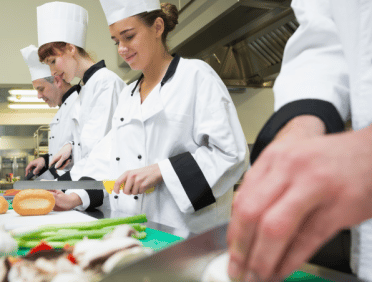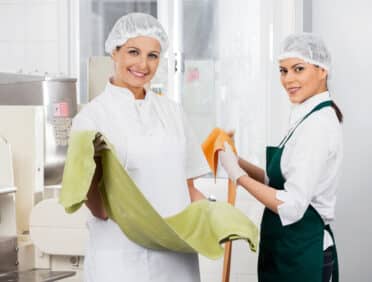Understanding the importance of food hygiene for anyone preparing or handling food for a living is not a nice to have, it’s a must have. The same principles apply from a small takeaway or retail business to a leading restaurant or hotel. You must take the right steps to protect your customers and set high standards around food safety, hygiene and preparation.
It can be tricky to know exactly what the legal requirements are about food hygiene but the simple message is this, you must take responsibility for training staff when it comes to food safety and provide evidence to match.
The simplest, safest and most accurate way to do this is by completing a food hygiene safety certificate. This provides verifiable proof that any person holding a certificate has been equipped with the tools to do their job safely for any customer, colleague or environmental health officer.
Food hygiene safety certificates broadly break down into three levels of qualification, which we will take you through in detail to make an informed decision on what suits the needs of your business or team.
What is a food hygiene certificate?
A food hygiene certificate provides evidence of successful completion an award, achievement or course focusing on the core elements of food safety. The certificate also offers peace of mind that any business owner or person handling food for a living takes the importance of good food hygiene and customer safety seriously.
What does a food hygiene certificate cover?
Each food hygiene certificate broadly covers the basic principles of preparing and handling food safely. The topics covered include personal hygiene standards, food storage and temperature control, preventing food poisoning, risks around cross contamination, and guidance around effective cleaning of premises and disposing of food waste safely. Certificates are tailored to the level of training needed but will contain those key elements of food safety and build the required knowledge and understanding from there.
What food hygiene certificate do I need?
Adequate training for anyone working with food served or sold to the public is a mandatory requirement by law. The level of training needed to meet that standard depends on a person’s role, responsibilities, and whether they are serving and handling food or preparing it too.
Anyone working with food should complete a Level 1 Food Hygiene Certificate as a minimum. This covers all the basics required to work with food to a professional standard.
For those handling, preparing, and serving unwrapped and fresh food, a Level 2 Food Hygiene course is much more appropriate. This is aimed at anyone working in catering, retail or hospitality and goes into more detail on applying knowledge in food safety standards and responsibilities. This course is particularly important for business owners or those working in bars, café’s, takeaways, hotels or catering in schools, colleges, universities and hospitals.
A Level 3 Food Hygiene course is more advanced and in depth, looking at a manager, team leader or business owner taking responsibly for creating a food safety and monitoring process. Completing this course is recommended for those training members of staff or looking for their business to earn a 5-star hygiene rating.
How many modules are typically in a food hygiene course?
The number of modules in a food hygiene will course can vary from course provided but you can expect to complete a minimum of 5 modules to earn a certificate, such as in Learn Q’s Food Safety Level 2 course. More advanced courses can include up to 15 modules.
How long is a Level 2 Food Hygiene Certificate valid for?
The Level 2 Food Hygiene Certificate does not have an expiry date and there is no legal requirement to renew the certificate once it’s been obtained.
However, to show evidence a business owner is taking safety standards of staff seriously, refresher training is recommended every 18 months to 3 years as a guideline.
How long is a Level 3 Food Hygiene Certificate valid for?
The Level 3 Food Hygiene Certificate does not have an expiry date and there is no legal requirement to renew the certificate once it’s been obtained.
However, it is recommended that refresher training is provided at least every eighteen months to three years to prove that safety standards are being taken seriously and proactively managed, based on your businesses’ risk assessment.
Is a food hygiene certificate a legal requirement?
The Food Hygiene (England) Regulations 2005 and the Food Safety Act 1990 requires food business owners in the UK to ensure food handlers receive appropriate training to do their jobs safely. A food hygiene certificate is not a legal requirement in itself but provides clear evidence this responsibility is being taken managed proactively. A certificate also demonstrates a member of staff of business owner is qualified to carry out their duties properly.
Who needs a Level 2 or 3 food hygiene certificate?
The Level 2 Food Hygiene Certificate is aimed at all managers, full-time and part-time workers preparing and handling food. It represents the recognized industry standard for anyone contacting food. It’s particularly helpful for those who have gone from serving food to preparing it.
The Level 3 Food Hygiene Certificate is more suitable for managers or supervisors of staff overseeing the handling and preparation of food. Team leaders, managers or new business owners would particularly benefit from gaining this qualification.
It is recommended by the British Safety Council that all food premises should have at least one employee with a Level 3 Food Hygiene Certificate.
What is a Level 1 Food Hygiene Certificate?
The Level 1 Food Hygiene Certificate provides evidence of basic knowledge on the principles of food safety standards. This qualification develops understanding in areas such as personal hygiene, food storage and temperature control, food poisoning, cross-contamination, and safe wastage disposal.
The course is suitable for those new to serving food in a professional setting, for example bar or front-of-house staff.
What is a Level 2 Food Hygiene Certificate?
The Level 2 Food Hygiene Certificate provides accredited training for business owners or staff who handle, prepare and serve food in a professional capacity. The Level 2 certificate covers the same core principles as the Level 1 certificate but builds on key areas relevant to food preparation, including cleaning premises to a high standard and controlling food safety standards.
The Level 2 certificate covers all the legal requirements needed for anyone making, preparing of serving food to consumers or the public.
What is a Level 3 Food Hygiene Certificate?
The Level 3 Food Hygiene Certificate is a more advanced course aimed primarily at managers, team leaders and supervisors overseeing food safety and preparation procedures.
It provides an advanced understanding of the basic principles of a Hazard Analysis Critical Control Point (HACCP) plan, a proven method of keeping food safe from biological, chemical and physical safety hazards.
How do I get a food hygiene certificate?
A food hygiene certificate is awarded following the completion of an accredited training course from an approved course provider. LearnQ can take care of everything here, teaching you the material, assigning qualifications and providing your certificate once the course has been successfully completed. This is true for both Learn Q’s Food Safety Level 2 Awareness and the Level 3 Award in Food Safety courses.
How can I check my food hygiene certificate?
Access to your food hygiene certificate depends on the way you complete your training. With Learn Q’s online courses, all the training and relevant qualifications are stored online by a Learning Management System.
This means you can access your food hygiene certificate at any time for a job interview, reference or health and safety inspection.
Can I take a food hygiene certificate course online?
A food hygiene certificate course can be completed entirely online in the comfort of your home or business. Full training, including registration, setup, help and assessments, are all completed through a dedicated online Learning Management System.
Online learning is convenient and cost effective, removing the need to travel or take time away home or work to gain the relevant training. You can also study when it suits you best, removing barriers to getting the right qualification.
Is a Level 2 Food Hygiene Certificate free?
It is possible to find free training courses which offer the Level 2 Food Hygiene Certificate, but there’s a strong chance this certificate may not be provided by a professional training provider and may not mean your business is compliant with legislation, best practice or regulations.
For the right support, industry recognition and above all a guarantee your training and certificate is legitimate, it is recommended to go with an accredited provider
Which food hygiene certificate is free online?
A quick internet search will provide a range of sample training materials around food hygiene and food safety, but a food hygiene certificate from a professional training provider will come with an appropriate cost to match.
What food hygiene certificate do I need for a burger van?
To operate and work in a burger van, it’s essential to have a strong working knowledge of storing and preparing food safely. At a minimum, a Level 2 Food Hygiene Certificate is required to provide the tools to understand how those principles work and can be put into practice in a working environment.
While that would be satisfactory evidence of training in food safety and hygiene, it’s highly likely the operator of a burger van will sometimes be working on their own. This means they will effectively be the manager of that business during that time and if that’s the case, a Level 3 Food Hygiene Certificate is more suitable.
The British Safety Council recommends that all food premises should have at least one employee with a Level 3 Food Hygiene Certificate, so this is worth bearing in mind as a burger van will often be run by a sole operator or small team.
Do you need a food hygiene certificate to sell cakes?
All UK food business owners must ensure anyone handling or preparing food must receive appropriate training in order to do their jobs safely. This is a legal requirement regardless of the size or scale of the business. The same rules apply for anyone selling cakes.
A food hygiene certificate is not a legal requirement for a food business, but it does provide clear proof that any business owner is taking those responsibilities seriously and their staff are training to a professional standard.
What is the highest food hygiene certificate online?
The highest food hygiene certificate you can complete is the Level 3 Food Hygiene Certificate. This is the most advanced course focusing entirely on food hygiene and safety and is aimed primarily at managers, team leaders and supervisors overseeing food preparation and storage in a professional kitchen.
You can download our free personal hygiene checklist by clicking here












